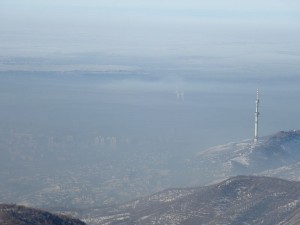The 2022 Winter Olympics in Almaty and the ecology of the candidate city were on the agenda of a recent press conference held at the Almaty City Akimat’s (Mayor’s) Office.
Almaty has not been named the site of the 2022 Winter Olympics, but in six months, a host city will be selected. At a meeting with journalists, it was clearly stated that the Almaty City Council (Maslikhat) fully supports the city’s application to the International Olympic Committee and second, they know about the IOC’s environmental requirements and the existing problems which Almaty would have to tackle in the coming years.
Deputy Chairman of the Almaty Maslikhat’s Environment, Public Health and Emergency Affairs committee Pavel Beklemishev made a detailed analysis of the ecological conditions in the city and the surrounding areas, while Deputy Director of the Executive Direction of the 28th Winter Universiade 2017 Organising Committee State Operated Fund Bauyrzhan Doskarayev discussed interesting details about the fight for a cleaner environment in former Olympic cities. In general, we have a clear picture of what we have now and what can happen if we do nothing to change the situation.
An illustrative example is Denver, Colorado in the United States, which won the right to host the Winter Olympics in 1976. City officials scrimped on issues related to improving environmental conditions due to protests from residents against the additional financial burden. The IOC quickly transferred the Olympics to Innsbruck. However, it is perhaps the only example of when ecology snuffed Olympic dreams; in all other cases, the candidate cities fulfilled all the requirements of the International Olympic Committee.
Sydney won the competition among candidate cities just before a crucial vote promising to include indigenous Australian music, dances and rituals in the programme of the 2000 games. A giant and not very environmentally friendly city, Beijing, during the 2008 Olympic Games, enforced a temporary rule for residents requiring that drivers with odd numbered vehicle license plates drive only on even days during August and vice versa. Imagine how much cleaner the air would be in Almaty if we reduced the amount of exhaust gases by half during the Olympics!
Polluted air is Almaty’s main problem. It is the indicator the IOC pays the most attention to, alongside recycling, drinking water quality and many other environmental issues. Though we do not have problems with drinking water thanks to the geographic location of Almaty in the foothills of snow-capped mountains, we have a great amount of work to do on the remaining ecological issues. We will need to study the experience of previous host-cities and the most recent global developments.
We can improve conditions in the air basin but we are not always sure of which course to follow. Today, private housing in Almaty is 95 percent gasified, while 90 percent of the houses are connected to the gas supply, though not all people are using it for economic reasons. It is necessary to transfer to more efficient fuels and use a more serious filtering system. In this respect, Almaty already has one achievement – it manufactures gas and the partially liquid fuel CHP-1. Kazakhstan has successfully mastered car manufacturing, but the production of electric vehicles can truly become a Kazakhstan brand, taking into account that the country has all the necessary raw materials.
It is clear that significant improvements in Almaty’s environmental conditions could become the legacy of the Winter Olympics, along with the new sports facilities, Olympic Village, cultural programme and so on. We will confront these issues if Almaty succeeds in its bid to host the Winter Olympics.
The author is an Almaty-based sports observer with the Kazakhstanskaya Pravda daily newspaper.

